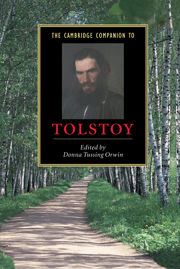Book contents
- Frontmatter
- Chronology
- Introduction
- Part 1 The three novels
- Part 2 Genres
- Part 3 General topics
- 7 The development of style and theme in Tolstoy
- 8 History and autobiography in Tolstoy
- 9 Women, sexuality, and the family in Tolstoy
- 10 Tolstoy in the twentieth century
- 11 Courage in Tolstoy
- 12 Tolstoy’s aesthetics
- Guide to further reading
- Index to Tolstoy’s works and characters
- Generel Index
11 - Courage in Tolstoy
from Part 3 - General topics
Published online by Cambridge University Press: 28 May 2006
- Frontmatter
- Chronology
- Introduction
- Part 1 The three novels
- Part 2 Genres
- Part 3 General topics
- 7 The development of style and theme in Tolstoy
- 8 History and autobiography in Tolstoy
- 9 Women, sexuality, and the family in Tolstoy
- 10 Tolstoy in the twentieth century
- 11 Courage in Tolstoy
- 12 Tolstoy’s aesthetics
- Guide to further reading
- Index to Tolstoy’s works and characters
- Generel Index
Summary
“… why doesn’t [Tolstoy] think, instead of taking everything by bravery, charging as if he were at Sevastopol?”
In a review of War and Peace, N. N. Strakhov, the critic who was later to become one of Tolstoy’s closest friends, wrote that the novel was about “the idea of the heroic life.” An essential ingredient of heroism is courage, which was a cardinal virtue for Tolstoy. A war hero himself, he first became known to the general public as the author of war stories about the siege of Sevastopol, at which he fought. (His earlier works had been signed with initials.) As the epigraph to this chapter suggests, his contemporaries perceived him, for better or for worse, as obsessed with courage. These qualities are apparent as well to those who only know him through his writings: an admiring Ernest Hemingway, for instance, saw him as a fighter without equal. The purpose of this essay is to explore what Tolstoy meant by courage, and why it was so important to him.
Not surprisingly, from the time Tolstoy arrived in the Caucasus at the age of twenty-two in 1851 and joined the army in 1852, he began a struggle to define what courage is. The war stories that he wrote in this period were anti-romantic, and most of what passes for courage in them stands revealed as mere show. In the early war stories and War and Peace, Tolstoy, sometimes sympathetically and often sarcastically, illustrates how men, inwardly trembling, outwardly strut their courage on the battlefield to win medals and fame. While debunking romantic heroism, however, he strove to replace it with “true” courage. The narrator of his first war story, The Raid (1852), finds this in the behavior of the modest Captain Khlopov (ch. 10). Dissatisfied with this effort, Tolstoy returns obsessively to the theme.
- Type
- Chapter
- Information
- The Cambridge Companion to Tolstoy , pp. 222 - 236Publisher: Cambridge University PressPrint publication year: 2002



